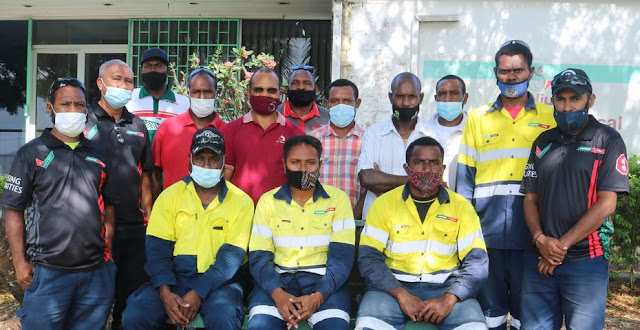Air Niugini Continues To Offer Training on Safety
AIR NIUGINI CONTINUES TO OFFER TRAINING IN DANGEROUS GOODS TO EXTERNAL CUSTOMERS.
Air Niugini is the only organization in the country offering Dangerous Goods (DG) training to external clients under the airline’s Part 141 training organization, through the Civil Aviation Safety Authority’s (CASA), Civil Aviation Rule (CAR) Part 92, Standard Aviation Training Certificate (SATC).
The training is being offered at Air Niugini’s Training Centre at 7mile here in Port Moresby. Last week, saw yet another group complete their week-long training. The group comprised of participants from Hevi Lift PNG, Puma Energy (Aviation), Daru Hospital (shipment of Infectious substances) and Unitech Lae (Chemical Safety Department).
 |
| Captain Jason Nonggor-r (on the left) and First Officer, David Seken(on the right) operated PX 130, a Fokker 100 flights . Photo credit : Air Nuigini/FB |
Dangerous goods are articles or substances that pose hazard to health, safety, property and environment and are listed in the International Air Transport Association (IATA) Dangerous Goods Regulations.
Air Niugini’s Non-Technical Training Instructor, Martin Tugano who normally conducts DG training explained that dangerous goods can be flammable liquids, explosives, radio-active materials, dangerous chemicals, infectious substances (Covid-19, TB, Polio cultures or samples) compressed gases, poisons and aerosols among others that pose high risks to the airlines, passengers and crew.
Tugano said “Dangerous Goods, especially hidden DGs like lithium batteries, aerosols, paints, mercury, human or animal blood or body samples and tissues must be carefully checked and packed in accordance with regulations before they are airlifted.”
He said transportation of dangerous goods by air is very restricted because of the pressure, temperature and vibrations experienced during air transport and therefore, it is important that companies who deal with dangerous goods need to undergo this training to help them understand what DGs are and how they can safely prepare them for transportation.
“All parties involved, freight forwarders, shippers, those sending and also those receiving the goods need to understand the requirements.”
 |
| AIR NIUGINI CONTINUES TO OFFER TRAINING IN DANGEROUS GOODS TO EXTERNAL CUSTOMERS |
Tugano also emphasized that passengers must comply and answer airline’s dangerous goods safety questions during check-in. These questions are necessary so that any risk to the aircraft and its passengers and crew posed by hidden dangerous goods are eliminated or minimized on the ground rather than in the air.
There was positive feedback from participants emphasizing that they have learnt a lot of new things during the week long training.
Solomon Bulu from Unitech Lae said “It was an eye opener, I learned a lot of new things. I will use the skills and knowledge gained here once I am back on the job”.
Jesse Wangoa from HeviLift said “Although the training was intense, it was very helpful and worth the money spent. The instructor is very knowledgeable on the subject matter.”
Apart from the training on dangerous goods by Air Transport, Air Niugini also conducts training on Dangerous Goods by sea transport (IMDG Code).
Air Niugini has trained many nationals and expatriates in all sectors, mostly targeting mining, exploration, airlines, freight forwarders, packers and chemical manufacturing companies.
“We have highly qualified instructors who can deliver these training programs tailored to your company’s needs. We can also provide on-site training if you have more than 10 participants,” Tugano concluded.
For further information and bookings, please contact Air Niugini on (675) 327 1481/ 73725101 or email: ekila@airniugini.com.pg or mtugano@airniugini.com.pg
Statement
You may also check out : Universities in Papua New Guinea


Post a Comment